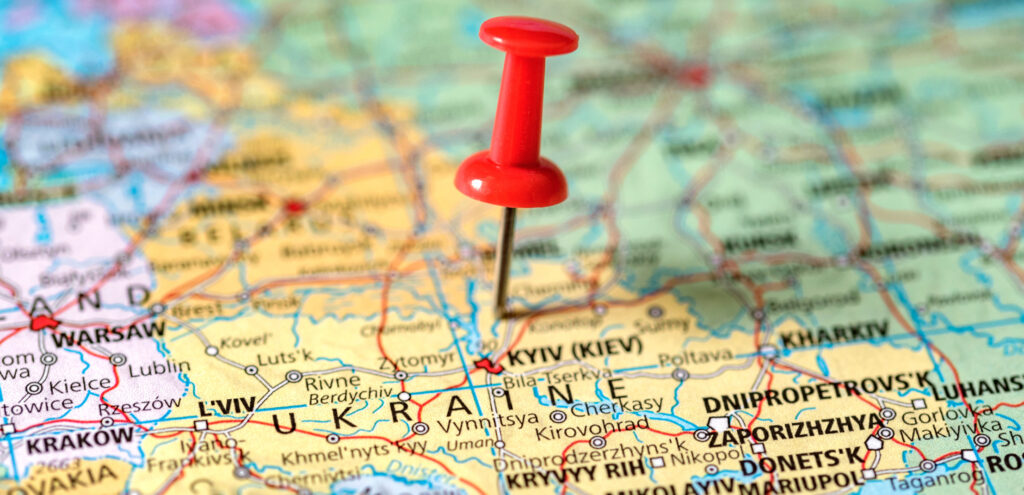Russian President Vladimir Putin’s recent invasion has forced Ukraine into the international spotlight, raising several questions about the names of Ukraine’s cities and the proper phrasing when referencing the country itself. In English, is the country’s capital “Kiev” or “Kyiv”? Stylistically, does it matter if someone says “the Ukraine” instead of “Ukraine”? These minute differences hold no significance to most, but to linguists, politicians, and locals, these differences matter.
In the case of Ukraine, the conversation surrounding toponyms, or the name assigned to a geographical feature or location, is particularly complex, mainly due to the long history of the USSR occupation and the coexistence of the Russian and Ukrainian languages within its present-day boundaries.
In the Russian language, when expressing location in reference to a territory, one has to choose between two prepositions: “na” and “v.” When deciding between the two, “na” is typically restricted to an unbounded territory, while “v” is more typically used for a politically bounded territory. Therefore, historically, Ukraine was referred to with “na” up until the collapse of the USSR; however, after the collapse, in 1993, Ukraine formally petitioned Russia to use the preposition “v” in reference to Ukraine because they argued that when one uses “na,” the speaker does not recognize Ukraine as a formal political territory. The Russian government responded by saying that language reflects tradition and suggested that language cannot be subject to rapid change due to politics.
This political prepositional battle went unsettled, and the division continues into today as most Ukrainian Russian-speakers use the pronoun “v” to refer to Ukraine, while most Russians still use the preposition “na.” Furthermore, following the Russian invasion of Crimea, in order to understand if the use of a particular pronoun was reflective of one’s political beliefs or instead, of other factors, researchers found “indisputable correlation between political allegiance and prepositional choice with…anti-Kremlin participants enact[ing]their political identity through a preference for the post-Soviet variant ‘v.’”
Seven years later, this political allegiance and political identity in speech remain prevalent in many Russians and pro-Russian Ukrainians, and their decision to use a particular pronoun and the debate, in general, highlight the very complex connection between the Ukrainian territory, the USSR and the Russian language. It also offers insight into why some Russians view Ukraine as rightfully theirs and explains their support of the invasion.
This same linguistic issue surrounding the recognition of Ukraine’s statehood in speech exists in English as well, with less political significance. In English, one has the choice to refer to the country as “Ukraine or “the Ukraine.” Similar to using “v” in Russian, in order to support and recognize Ukraine’s sovereignty, one should omit the “the” before the country’s name.
Besides the country’s name, this phenomenon extends to city names, with Ukraine’s capital frequently spelled as both “Kyiv” and “Kiev.” This, too, demonstrates a history of USSR occupation and Russian presence in Ukraine. Historically, the name “Kiev” was used because that was the transliteration of the city in Russian; however, since the independence of Ukraine, the preferred transliteration by locals, specifically Ukrainian speakers, is “Kyiv” because this more closely reflects the Ukrainian city title.
The significance of toponyms is not new nor exclusive to the situation in Ukraine. Historically, around the world, toponyms have been used as political tools to advance decolonization, propaganda and revolution.
In 1995, to move away from the colonial legacy of the British, the political party Shiv Sena renamed India’s most populated city, Bombay, to Mumbai in homage to Indian history and goddess Mumbadev. This process of renaming cities within India was not exclusive to its largest city — it was a part of a larger decolonial movement away from the British, with many cities throughout the country being renamed.
Another example of this is Myanmar, formerly known as Burma. The country was called Burma during and following its colonial rule, after its largest ethnic group, the Burmese. After a 1989 political upheaval, the government attempted to change its English name to Myanmar. This decision is believed to be a political act attempting to establish international legitimacy for the new regime by separating itself from its colonial past.
The move was advertised to the world as an attempt to unify the country’s multiple ethnic groups. However, many believe this to just be symbolic since the exonym, the name used by locals, remains “Burma,” with “Myanmar” only used for more formal situations in the Burmese language. Nevertheless, the decision can be defined as a successful political tactic given that most English speakers use “Myanmar” today, including President Obama during his presidential visit to the country.
Beyond the potential for propaganda, names can also be a form of political suppression, as is the case with the political toponym of the city known as “Londonderry” in Northern Ireland. Although this is the town’s official name under United Kingdom law, many nationalists refer to the city as “Derry,” and there was even a recent petition and protest attempting to change the name, yet, for political reasons, the UK denied the change. Today, there continues to be tension between the two parties, and the city’s name remains a contentious subject.
Toponyms are political tools — reflections of cultures and windows into a place’s history. Despite the long history behind naming locations, it is only in recent decades that society has begun to grapple with the importance of toponyms. The current crisis in Ukraine has helped answer the age-old question of “What’s in a Name?”







